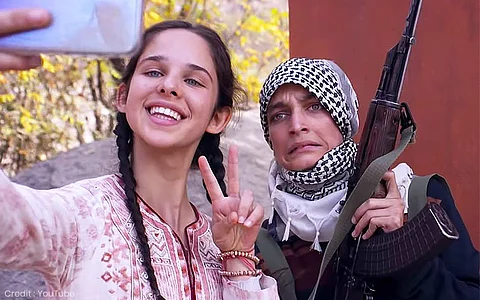
- Reviews
- Power List 2024
- Cannes 2024
- In-Depth Stories
- Web Stories
- News
- FC Lists
- Interviews
- Features
- FC SpecialsFC Specials

Director: Ashvin Kumar
Cast: Zara Webb, Shivam Raina, Ashvin Kumar, Soni Razdan, Anshuman Jha, Kulbhushan Kharbanda
With the elections around the corner, it's not just the Prime Minister who can stake claim to being the latest rage in Hindi cinema. Ashvin Kumar's No Fathers in Kashmir is the third commercially released Kashmir movie – after Hamid and Notebook – in three weeks. Together, they cover all the three age-bases of narrative manipulation: Hamid simplified the conflict through a fatherless child's naivety, Notebook exploited the picturesque land to frame an oblivious old-school romance, while No Fathers in Kashmir condemns the politics through the hearts of two lovestruck teenagers.
Kumar is arguably more familiar with the region than most directors; some of his most acclaimed work – the Oscar-nominated short, Little Terrorist, and the documentaries Inshallah, Football and Inshallah, Kashmir – stems from the Valley's inherent unrest and paradise-hell paradox. No Father in Kashmir is scripted smartly, with characters whose survivalistic morality is consistently tested by an inherent sense of humanism. But the execution is a bit muddled, almost as if the director decides to compromise his awareness in favour of on-the-nose activist filmmaking. Which is why it's unsurprising that Kumar supplies his NRI protagonist's coming-of-age arc with the crutch of young love. Maybe the hint lies in the way he positions his impassioned narrative – with a conscious attempt at accessibility…gentrification almost.
He chooses a London-based Kashmiri Muslim as his lead character, Noor (Zara Webb), so that her ignorance about her roots reflects – and perhaps appeals to – the privilege of regular urban Indians (who I presume this film is aimed at) and armchair administrators. Her British boyfriend asks her to "take a selfie with a terrorist" before she visits her ancestral village – a crude request that contextualizes the outside gaze without making it look entirely gimmicky. Noor is obsessed with cell-phone photography, a trait that is supposed to naturally showcase the visual splendour of Kashmir; every time she clicks a picture, the screen breaks out into an abrupt montage of touristy vignettes scored to genre-fluid music. The phone – her "modernism" in a land torn by traditionalism – later becomes a crucial plot device. In a technique that can only be described as pretentious, the camera, too, goes all handheld and blurry to internalize scenes of actual violence; it's always a problem when the effort to depict an environment differently is so obvious.
The director himself plays a character named Arshid, a tortured jihadi whose eloquent bitterness – he engages with Noor's sudden quest for justice – exists solely to distinguish a terrorist from a militant. Arshid reflects the director's direct cry to his viewers; he stops short of breaking the fourth wall and narrating his opinions to us. Like a stage villain, his words are philosophical and studied ("the dogs of Kashmir are different; they know the taste of human flesh"). And his shot at redemption feels too convenient, too necessary, which sort of defeats the purpose of his rabid radicalism.
This posturing is unfortunate, because Noor's curiosity lends itself naturally to the mining of the whispers behind the world's largest "secret war". Her situation is intricate. Noor tags along with her mother: a woman who returns to convince her old in-laws to legally forget their son, her missing husband, who was picked up by the Indian army years ago. The half-widows and half-orphans of the region are half-brought into focus through this plea. Noor, though, reflects her grandparents' irrepressible hope in the way she snoops around town with the local boy, Majid. Their chemistry is odd and cutesy; it's not the first time a poor boy's broken English charms the pants off a London-return heroine. Their time together (scooter rides, bonfires, stars) is needlessly romanticized, almost as if attachment were a narrative prerequisite to demonstrate the vulnerability of strife. I get that their relationship is exaggerated so that the conflict between them feels more pronounced, but perhaps a simple, quiet friendship between the two might have served the film more gracefully.
In trying to show us the army-militant divide through Noor's eyes, Kumar also literally uses her eyes too often: Much of her visit is spent following shady characters, eavesdropping on adult conversations, being omnipresent and hiding behind pillars and trees. Speaking of eyes, Noor's are strikingly light and beautiful, as are those of Majid's, in a way that deliberately mirrors Nat Geo's famous Afghan Girl photograph: an image that, to this day, caters to the civilized world's aesthetic perception of war. I've always believed that the picture doesn't tell a thousand stories; it exoticizes a hundred. No Fathers in Kashmir is the cinematic embodiment of this image – and not entirely in a good way.